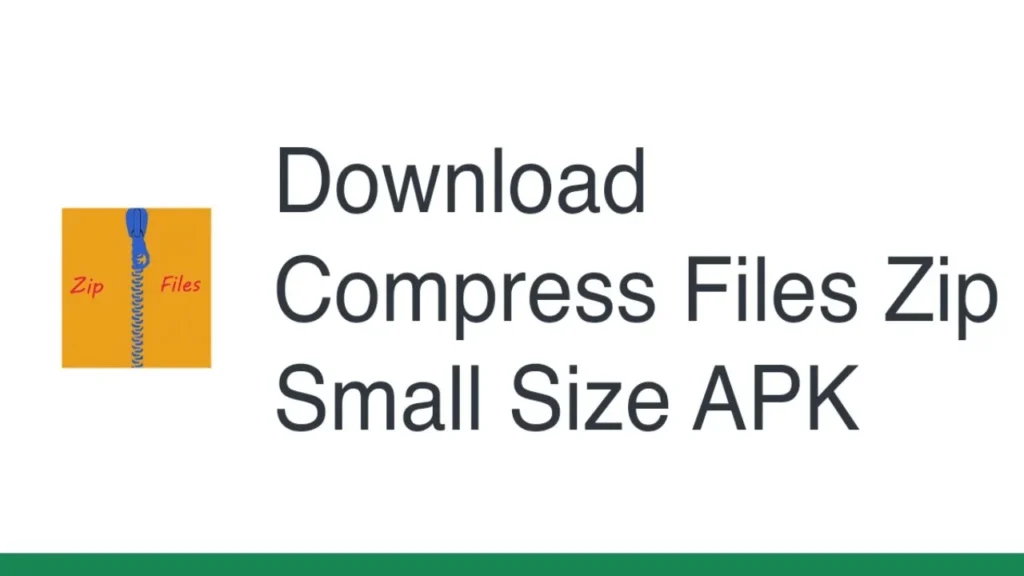Understanding to Compress APK Files for Smaller Size

How to Compress APK Files for Smaller Size Download are fundamental for appropriating and installing apps on Android devices. However, as apps fill in intricacy, APK files can turn out to be enormous and occupy critical storage rooms. To ensure smoother execution, decrease information use, and further develop client experience, compressing APK files to a smaller size is essential. This interaction diminishes the record size without influencing the usefulness of the app.
This article will investigate different procedures to compress APK files effectively. We will likewise examine the significance of compressing APKs, apparatuses you can utilize, and best practices.
Techniques for Compressing APK Files
There are a few strategies you can use to compress APK files. Here is a breakdown of probably the best ones:
Remove Unused Resources:
Numerous APK files contain superfluous assets like pictures, sound files, or unused code. Eliminating these resources is one of the least difficult ways of contracting the document size.
You can utilize instruments like ProGuard to eliminate unused code and classes. For unused assets, the Android Studio asset contracting element can kill them naturally during the form interaction. By tidying up the record, you save money on storage without losing usefulness.
Use WebP Images Instead of PNG or JPEG:
Pictures frequently take up a huge piece of an APK record’s size. WebP is a cutting-edge picture design that gives top-notch visuals while keeping a smaller record size. Supplanting PNG or JPEG pictures with WebP forms can fundamentally diminish the size of your APK record.
WebP offers lossless compression, and that implies the quality of remaining parts in one piece. Android Studio upholds WebP change, and it can undoubtedly deal with picture design transformations during the form interaction.
Compress Native Libraries:
Local libraries can likewise be compressed for smaller APK sizes. If your app utilizes local code (like C or C++), you can compress the local libraries utilizing devices like UPX (Extreme Packer for eXecutables).
This instrument compresses the executable code and libraries without altering the way the app capabilities. Compression of local libraries can yield outstanding size decreases.
Enable ProGuard for Code Shrinking:
ProGuard is a free device included with Android Studio. It helps contract the code, eliminate unused code, and upgrade the app. Empowering ProGuard during the form cycle can assist you with diminishing the size of your APK record.
To empower ProGuard, you want to add proguard rules.pro record in your undertaking. From that point forward, the form setup ought to be changed by empowering the device during the APK assemble process.
Split APKs by Screen Density and Architecture:
Android devices come in different screen densities and structures. Rather than packaging assets for all devices, you can part APK files given the objective device.
The bundle tool utility permits you to make separate APKs for various screen densities, central processor structures, and dialects. At the point when a client download your app, they just get the APK that matches their device design, diminishing the general APK size for individual clients.
Use APK Analyzers:
APK Analyzers assist with recognizing enormous files inside your APK. This apparatus, accessible in Android Studio, separates the APK record and features the files that occupy the most room. By inspecting this information, you can zero in on the biggest files and compress them for smaller sizes.
APK Analyzers additionally show you which files are not compressed, permitting you to make further enhancements.
Use R8 to Replace ProGuard:
R8 is a code-contracting device that is the replacement for ProGuard. It carries out similar roles as ProGuard however does so more productively. It recoils code, eliminates unused classes, and limits the APK size.

R8 is quicker and performs better enhancements, bringing about a much smaller APK record. By changing to R8, you can save money on form time while additionally contracting the APK size.
Compress Asset Files:
If your APK contains resource files like textual styles, sounds, or different information, think about compressing them. Compressing these resources into designs like Compress or GZIP can decrease their size without influencing how they are stacked in the app.
At the point when the APK is installed, the Android framework naturally decompresses these resources, guaranteeing the app works ordinarily.
Best Tools for Compressing APK Files
Now that we’ve covered the strategies, we should see a few instruments that can make the compression cycle simpler.
Android Studio:
Android Studio is the authority IDE for Android advancement. It gives worked-in apparatuses like APK Analyzer, ProGuard, and R8 to assist with compression. Android Studio likewise upholds WebP transformation and asset contracting.
ProGuard:
ProGuard is an amazing asset that enhances Java code by eliminating unused parts. It is remembered for Android Studio and can be empowered during the form cycle to diminish the APK size.
R8:
R8 is the default code shrinker in Android Studio, supplanting ProGuard. It performs better and quicker improvements, coming about in smaller APK files and quicker fabrication times.
UPX:
UPX is a well-known instrument for compressing executables and libraries. It functions admirably with local libraries and decreases the size of APK files that incorporate local code.
Bundletool:
This utility permits you to make different APKs given device setups. By parting APKs for screen thickness, design, and language, you limit the APK size for individual clients.
Benefits of Compressing APK Files
The benefits of compressing APK files are numerous. Let’s break them down:
Faster Downloads:
A smaller APK record downloads quicker, giving clients speedier admittance to your app. This is particularly valuable for clients in regions with slow web associations.
Reduced Storage Space:
Compressing APK files implies clients need less storage space to install the app. This makes your app more open to clients with low storage limits, which can expand the app’s install base.
Improved App Performance:
At the point when APK files are enhanced, they execute all the more effectively. This can prompt quicker load times and smoother execution, particularly on devices with restricted assets.
Lower Data Usage:
For clients with restricted information designs, a smaller APK record implies less information is expected to download the app. This can bring about additional clients downloading and attempting your app.
Reduced Hosting Costs:
If you’re facilitating your APK files on a server, smaller document sizes can decrease how much storage you want. Thus, this can bring down your facilitating costs, particularly if your app has a huge client base.

Best Practices for APK Compression:
While compressing APK files, it’s important to follow some best practices. Here are a few tips:
- Continuously test your app after compressing it to ensure it works true to form. Compression shouldn’t think twice about the app’s presentation or elements.
- Routinely use APK Analyzers to screen the size of your APK files. By following enormous files, you can distinguish regions for enhancement.
- If your app focuses on a great many devices, consider parting APK files given the device setup. This lessens the size for every individual client.
- As new instruments and strategies are created, continue refreshing your techniques for compressing APK files. Utilize present-day designs like WebP and high-level instruments like R8 for improved results.
More Queries: How to Create APK Files from Android Studio
Why Compress APK Files?
- Compressing APK files has various advantages.
- Initially, a smaller APK document downloads quickly.
- This is especially significant for clients with restricted web speed or information.
- A smaller record size lessens transfer speed utilization.
- Also, it upgrades the client experience by diminishing the time it takes to install the app.
- Also, compressing APK files can make apps more open.
- Since Android devices accompany fluctuating storage limits, clients with restricted storage space can in any case install your app.
- Compression additionally diminishes the expense related to information storage and circulation.
- At last, smaller APK files load quicker when executed, which can prompt better app execution.
Conclusion
Compressing APK files is fundamental for conveying quicker downloads, better execution, and further developed client experience. By using instruments like Android Studio, ProGuard, and R8, and applying methods, for example, asset contracting, local library compression, and APK parting, you can fundamentally lessen the size of your APK files. Smaller APK files save storage and transmission capacity as well as improve the general convenience of your app. With the right methods and devices, you can ensure that your APK files are advanced for progress.




